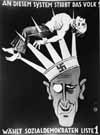
|
|
|

|

|

|

|
|
Click on an image to see a larger, more detailed picture.
|
|
|
|
|
| PROLOGUE: Roots of the Holocaust |

|
pg. 51 |

|
|
|
|
| |
 Showing a German impaled on the Nazi crown of a monocled monarchist, this poster from the Social Democratic Party cautioned voters to reject reactionary parties.
Showing a German impaled on the Nazi crown of a monocled monarchist, this poster from the Social Democratic Party cautioned voters to reject reactionary parties.
Photo: Ullstein Bilderdienst
|
 The "Hitler cult" embraced by many Germans was expressed, in part, by postcards such as this. The stylized rays of the sun suggest that Hitler heralds the dawn of a new, greater Germany.
The "Hitler cult" embraced by many Germans was expressed, in part, by postcards such as this. The stylized rays of the sun suggest that Hitler heralds the dawn of a new, greater Germany.
Photo: Bildarchiv Preussischer Kulturbesitz
|
|
Hindenburg's victory brought Germany neither peace nor unity. The Weimar Republic's parliamentary system had been especially shaky since September 1930, when it became clear that no government could rule Germany without Nazi support. On July 31, 1932, elections for the Reichstag brought the Nazis nearly 14 million votes (37 percent of the total and 230 Reichstag seats), a total higher than the combined results of the Nazis' two closest rivals, the Communists and the Social Democrats. Braced by this showing, Hitler was determined to be chancellor, the prime minister of the German government. Political opponents still had sufficient strength to frustrate Hitler's ambition, and the tide turned against him--momentarily. Hitler's subsequent refusal to join any coalition government forced new elections, which were held on November 6, 1932, at a time when the worst of the economic crisis was starting to subside. The election results were far from those that the Nazis desired; the NSDAP received two million votes fewer than it polled in July. Although the Nazis remained the largest party in the Reichstag, they had lost 34 seats. Their momentum seemed to be stalling. Although Hitler was stunned and discouraged at the end of 1932, his fortunes soon improved dramatically. Faced by the prospect that no sustainable government would emerge after the November election, Hindenburg used his constitutional authority on January 30, 1933, reluctantly appointing Hitler, a man he despised, chancellor of Germany. Hitler had not seized power. In fact, the power he wanted had nearly eluded him. Instead, it was handed to him by those who thought he could be controlled. Hindenburg's decision was taken to prevent an overthrow of the existing order, but unintentional though the outcome was, his appointment put Hitler's vision in control. That result led to Fritz Gerlich's bloody spectacles. It also plunged Germany into the unprecedented evil of the Holocaust. On February 1, 1933, Adolf Hitler spoke to the German people on the radio for the first time as chancellor. He ended by appealing to the Almighty to bless his government's work. On that day, Elie Wiesel was not yet five years old. Forty-six years later, Wiesel would write about Auschwitz-Birkenau: "The beginning, the end: all the world's roads, all the outcries of mankind, lead to this accursed place. Here is the kingdom of night, where God's face is hidden and a flaming sky becomes a graveyard for a vanished people." Darkness was poised to fall across Europe.
|
|

|

|

|

|
 August 13, 1932: German President Paul von Hindenburg offers the vice-chancellorship to Hitler, who refuses.
August 13, 1932: German President Paul von Hindenburg offers the vice-chancellorship to Hitler, who refuses.
|
 October 1932: The Nazis, now in power in the region encompassing Dessau, evict the Bauhaus design school from the city, signaling the Party's abhorrence for forward-thinking art and aesthetics.
October 1932: The Nazis, now in power in the region encompassing Dessau, evict the Bauhaus design school from the city, signaling the Party's abhorrence for forward-thinking art and aesthetics.
|
 October 17, 1932: The Paul Reveres, an anti-Communist and antisemitic organization, is founded in the United States and chaired by Colonel Edwin M. Handley.
October 17, 1932: The Paul Reveres, an anti-Communist and antisemitic organization, is founded in the United States and chaired by Colonel Edwin M. Handley.
|
 November 6, 1932: In elections for the Reichstag, the last free elections before Hitler's ascension to power, votes attracted by National Socialist candidates fall to 33.1 percent. The number of seats held by National Socialists dips from 230 to 196.
November 6, 1932: In elections for the Reichstag, the last free elections before Hitler's ascension to power, votes attracted by National Socialist candidates fall to 33.1 percent. The number of seats held by National Socialists dips from 230 to 196.
|
 December 3, 1932: General Kurt von Schleicher, a political conservative who will prove no match for Hitler, is appointed chancellor of Germany.
December 3, 1932: General Kurt von Schleicher, a political conservative who will prove no match for Hitler, is appointed chancellor of Germany.
|
|
|
|
|
| PROLOGUE: Roots of the Holocaust |

|
pg. 51 |

|
|
The Holocaust Chronicle
© 2009 Publications International, Ltd.
|
|
